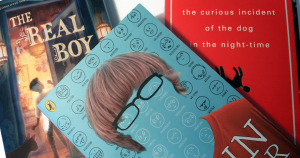Normalcy vs. Needs
Here’s the thing no one tells you about people with a medical condition: The disease is always on their mind, but they don’t always want to think about it.
Here’s the thing no one tells you about people with a medical condition: The disease is always on their mind, but they don’t always want to think about it.

Severe, chronic vertigo associated with migraines like mine is a “silent” disability, one people can’t see. Many people are compassionate. But others lack sensitivity, assume you’re faking it or just have a headache and will get over it.

I’ve never written fiction about living with Crohn’s, and to be honest, I’ve never wanted to. Perhaps because I still feel what I felt for years growing up: that nobody wants to hear about my annoying, humiliating misery. Yet I know, intellectually, that this is a shame, because there should be more characters in YA literature who live with chronic illnesses like IBD.

According to pop culture, mentally ill people are magically more creative, filled with a manic drive to create art that pushes them to the brink until they finally explode.

Did you know in the US it’s illegal to drive within six months after having a seizure? Even under supervision, even just around the block, I wasn’t trusted behind a wheel.

Here is a key insight to creating realistic autistic characters: We do not do the visibly autistic things we do because of “autism,” full stop. Like non-autistic people, we are responding to our experiences of the world. Those experiences simply differ from those of non-autistic people.

An estimated 1 in 7 women suffer from chronic pelvic pain; it’s bizarre and disappointing that despite these statistics, there are distinctly zero characters with this condition.

After second grade, I stopped reading most books unless they were assigned for class. Even then, I often didn’t read them. The reason being, when I read a sentence, I often didn’t understand it. Somewhere between my eyes seeing the words and my brain, the phrase disappeared into the ether.

When I received my diagnosis of Asperger’s syndrome seven years ago, I thought of all the young people today who face the social challenges and bullying that I faced decades earlier. I wanted to create a character like me, but one who fights back against the way others treat her in a way that I never did.
It wasn’t until I was an adult that I could finally understand that from the time of my diagnosis, my education was not going to be “complete,” because I did not have the full access I needed. It was as if intensive speech therapy and itinerant teachers were more important than having a sign language interpreter in my classes.